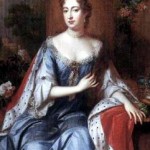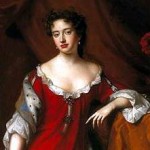The Union between England and Scotland
Category: 18th century Mary II and William III had no surviving children, and William was succeeded by Queen Anne, Mary’s younger sister. The major event of Queen Anne’s reign was the formation of the Kingdom of Great Britain.
Mary II and William III had no surviving children, and William was succeeded by Queen Anne, Mary’s younger sister. The major event of Queen Anne’s reign was the formation of the Kingdom of Great Britain.
Early in the 18th century England and Scotland were ruled by the same monarch, but they remained two separate kingdoms. In 1707 the Kingdom of Great Britain was formed by the Act of Union between England and Scotland. London, the biggest city in Britain, with a population of about half a million, became the capital of the entire island.
Great Britain from then on had a single Parliament and a single system of national administration and taxation. Even units of weights and measures were unified.
 The Union between England and Scotland skillfully engineered in 1707, the most radical innovations in British political life, was a union of parliaments: forty-five Scottish members were added to the 513 members of the English House of Commons and sixteen Scottish peers to the House of Lords. After 1689 the case for a union was very strong indeed. England had adopted the Hanoverian succession, the country had been involved in war with France and was fearful that there might be a Jacobite invasion through Scotland. By the union the English avoided the danger of a separate Scottish foreign policy. The Act of Union was intended to strengthen the country weakened with the War of the Spanish Succession.
The Union between England and Scotland skillfully engineered in 1707, the most radical innovations in British political life, was a union of parliaments: forty-five Scottish members were added to the 513 members of the English House of Commons and sixteen Scottish peers to the House of Lords. After 1689 the case for a union was very strong indeed. England had adopted the Hanoverian succession, the country had been involved in war with France and was fearful that there might be a Jacobite invasion through Scotland. By the union the English avoided the danger of a separate Scottish foreign policy. The Act of Union was intended to strengthen the country weakened with the War of the Spanish Succession.
The Scots obtained access to the English colonies. Scotland had long been dissatisfied with English indifference to her economic aspirations. Due to the Union of 1707 Scotland ceased to be “the wilderness to the English garden”. From a country poor in national resources and rich in native talent trained in one of the best educational systems of the time, the Scots invaded the English colonies and England itself. They became customs officers in Jamaica, doctors in London, and district magistrates in British India.
The basic principles of the Union were the protestant succession to a united monarchy, the establishment of a single state with one parliament and one executive, a common economic and fiscal system. While the Scots parted with their parliament and separate executive they kept their separate legal system, separate church, and separate educational system.
Since then the British has been proud of their government which combined monarchical (the hereditary ruler), aristocratic (the hereditary House of Lords), and democratic (the elected House of Commons) elements. The reign of Queen Anne had been marked by parliamentary elections that took place every three years.
Queen Anne had no surviving children. She was succeeded by her nearest Protestant relative, the elector of Hanover, who came from Germany in 1714 and was accepted as King George I of Great Britain. A new era of British history began.
